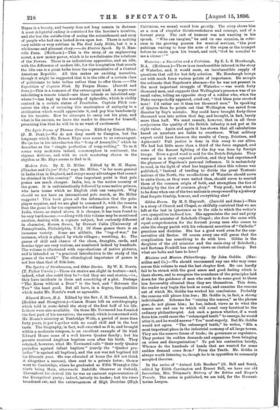Waterloo : a Narrative and a Criticism. By E. L.
S. Horsburgh,
(Methuen.)—There is an inexhaustible interest in the story of Waterloo, and, it would seem, an inexhaustible supply of questions that call for but defy solution. Mr. Horsburgh brings out with much force various points of importance. He accepts the estimate that Napoleon's absence—for he was not present in the most important struggle of Waterloo — was worth forty thousand men, and suggests that Wellington's presence was of no small value, telling an apposite story of a soldier who, when the Duke unexpectedly appeared, cried out, " God bless your crooked nose ! I'd rather see it than ten thousand men." In speaking of Quatre Bras he points out that Wellington was saved from disaster by Ney's mistake. Ney could have brought forty-three thousand men into action that day, and brought, in fact, barely more than half. We must remark, however, that in all these conjectures the quality of the British infantry is not put at its right value. Again and again it has shown that all calculations based on numbers are liable to overthrow. What military expert could have foreseen the results of Crecy, Poictiers, and Agincourt? Full justice is done in this essay to our allies. We had but little more than a third of the force engaged, and some of the fiercest fighting of the day was done by foreign troops. Even a good word is said for the Dutch-Belgians. They were put in a most exposed position, and they had experienced the glamour of Napoleon's personal influence. It is melancholy to read, in the light of what has happened since this volume was published, " Instead of tending to divide the great Teutonic nations of the North, the recollections of Waterloo should serve to unite them, as they were united then, should serve to remind them of the common origin of both, and strengthen the ties of kinship by the ties of common glory." Very good ; but what is to be done when one of the two nations is overpowered by a jealousy that forgets kinship, honour, and everything else?


































 Previous page
Previous page